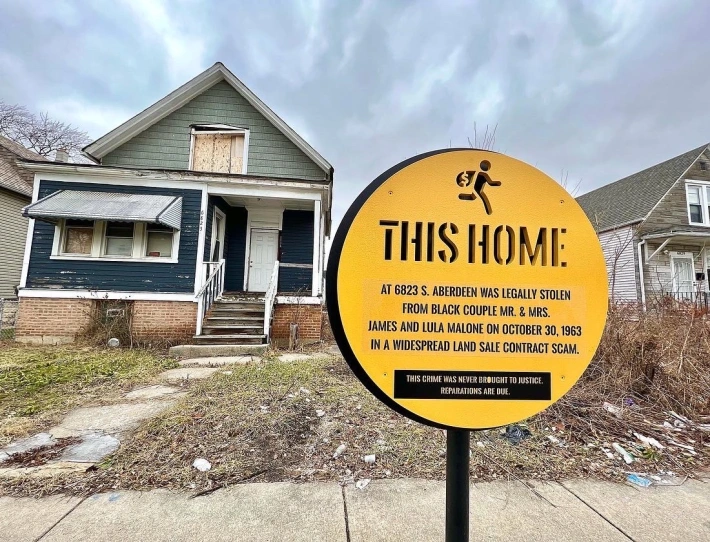Visit the Inequity for Sale website
Step into the narrative woven by Tonika during her 2021 Artist-as-Instigator residency at the National Public Housing Museum. Her project, “Inequity For Sale,” unveils the untold stories of Greater Englewood homes sold on Land Sale Contracts (LSC’s) in the ’50s and ’60s, exposing how these predatory contracts directly fueled the present wealth gap and community disinvestment we see today.
In an era where racist policies barred Black aspiring homeowners access to traditional mortgages, LSCs emerged as an exploitative practice, trapping homebuyers in exorbitant payments without granting ownership. A Duke University study reveals that 75-95% of homes sold to Black families during this period followed this dubious route.
Tonika’s “Inequity for Sale,” features 13 life-size land markers and a compelling website chronicling this era of exploitation, connecting history to contemporary realities in Greater Englewood.

The Land Markers
Tonika collaborated with architect and urban planner Paolo Aguirre to design compelling landmarks, visually embodying the legalized theft that occurred in specific, Black neighborhoods in Chicago. Together, they’ve translated the narrative of historical injustice into tangible structures that speak volumes about the systemic challenges faced by these locations.

Inequity for Sale: The Interactive Website
Keep up with the project via the Inequity for Sale website, which will be updated with each phase of the project.


2022 Art Expo
In 2022, “Inequity for Sale” made its mark at EXPO Chicago in the Weinberg/Newton booth, where visitors gained insight into the project, the impact of land sale contracts, and the predatory practices that have left an enduring legacy of inequity, continuing to resonate in the fabric of Chicago today. For more details, check out this ARTnews article which provides an in-depth look at the installation and its significance.

Inequity for Sale: The Podcast
“Legally Stolen” is a three-episode podcast produced by Tonika Lewis Johnson and the National Public Housing Museum that unpacks the revelations from the Inequity for Sale project. Originally presented as a live event at Kennedy King College, you can now tune in and explore the episodes for yourself. Listen here.

Press for Inequity for Sale
The project and its impact was covered widely in the area.
Channel CW26’s On The Block
August 2022
NBC5 CHICAGO
February 2022
NATALIE MOORE FOR WBES
March 2022- Acclaimed Race & Inequality reporter Natalie Moore covered the project for WBEZ. Click to listen to the audio story, and read the corresponding article here.
BLOCK CLUB CHICAGO
March 2022- Block Club Chicago report on the owner of an abandoned Englewood home who removed the landmarker in front of his property. Read the full story here.
February 2022- Block Club Chicago wrote about the installation of the first two land markers. Read more here.
November 2021- The outlet covered the beginning of the project. Read more here.
CRAIN’S CHICAGO BUSINESS
December 2021- Artist maps Englewood homes where land sale contracts denied Black residents ownership Read more here.

Learn More About Land Sale Contracts
Tonika’s work shines a modern spotlight on land sale contracts, but historians have long delved into the devastating impact of land theft. Explore some recommended resources curated by the artist to deepen your understanding of this predatory system.
The Plunder of Black Wealth in Chicago
Duke University’s Samuel DuBois Cook Center on Social Equity conducted a 2019 study that found Black families in Chicago lost an estimated $4 billion to predatory contract buying—the first report to put a dollar amount on this discriminatory practice. Download the complete report here.
The Color Tax
In this excerpt from “The Color Tax,” part of the five-part “The Shame of Chicago” film series, Chicago native and producer Bruce Orenstein demonstrated the devastating impact that land sale contracts had on Black wealth building and racial comity in Chicago. He explores the origins, starting with the predatory sale of contract homes post World War II that plundered wealth from Black families unable to secure safe mortgages due to redlining. Learn more about the film here.

































